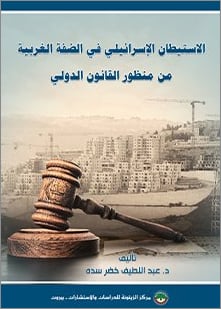Al-Zaytouna Centre for Studies and Consultations has published a new Arabic book entitled Israeli Settlement in the West Bank From an International Law Perspective. The 284-page book is originally a doctoral dissertation in law, based on which ʻAbdullatif Khader Sedda obtained a doctorate degree from the University of Istanbul in 2020.
The importance of the book stems from the fact that it explains the legal provisions of the Israeli settlement in the Palestinian territories occupied in 1967 in accordance with international law, international conventions, international resolutions issued by the United Nations Security Council, and the recommendations of the United Nations General Assembly. It also points out the Israeli gross violations of human rights and international humanitarian law; and highlights the settlement expansion, being the main obstacle to independence, freedom and the right of the Palestinian people to self-determination. The new book clarifies how settlement expansion eliminates the possibility of achieving the two-state solution, which is based on Security Council and General Assembly resolutions.
In his book, Sedda seeks to explain the facts about the Israeli settlement construction in the West Bank (WB) after the 1967 war, where WB is considered the basis of the Palestinian state according to the 181 General Assembly Resolution, the Partition Resolution of 1947.
|
>> Click here to download: |
Israeli settlement in WB violates the right of peoples to self-determination. It blatantly violates international law, international humanitarian law, the 1948 Universal Declaration of Human Rights, the Fourth Geneva Convention of 1949 relative to the protection of civilian persons in time of war, the 1977 Additional Protocol (I) to the Geneva Conventions, the 1907 Hague Convention, and the International Covenant on Civil and Political Rights.
Settlement building is based on the appropriation of land and the confiscation of property belonging to the local population. It changes the demographic structure of the occupied territories through the forced displacement of the Palestinian population, replacing them with Israelis, while preventing the Palestinian residents from the freedom of movement. The occupation drains the economy of WB and steals the civilizational and cultural heritage of the Palestinian people.
The study deals with the Israeli settlement in WB, since its occupation in 1967 until 2017, focusing on the period following the signing of the Oslo Accords in 1993.
The author defines the legal dimensions of the Israeli settlement building from an international law perspective, explaining the legal violations it represents. He also states the means available to confront it, while identifying the obstacles. For none of the international resolutions issued by the UN Security Council and General Assembly, which call for an end to Israeli settlements, have been implemented.
The book answers the following questions: How does Israeli settlement violate international law? How does settlement building end the two-state solution, which is based on the UN Security Council resolutions? What are the available means to end the Israeli occupation and settlement of the occupied Palestinian territories, in accordance with the international law? Do Oslo Accords constitute an obstacle to the Palestinian tendency to confront settlement building? and how can bilateral international agreements ratified by the Palestinian Authority be used to limit Israeli settlements?
The book is divided into three main chapters. The first chapter examines the international legal status of the occupied Palestinian territories, the historical development of the Palestinian legal system, Israel’s refusal to apply international law, and its disregard for United Nations resolutions. The second chapter deals with the Israeli settlement in WB, its origin, its philosophy and its most important projects. It explores the conditions of Israeli settlements and outposts in WB, and the suffering the cause to the Palestinians. As for the third chapter, it discusses the Separation Wall and settlements in accordance with international law and the advisory opinion of the International Court of Justice. It also discusses the right to self-determination, the role of international law in confronting settlements and prosecuting Israel. At the end, the book states some conclusions and recommendations.










Leave A Comment